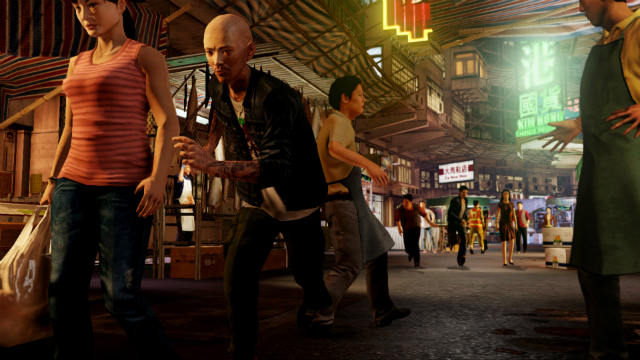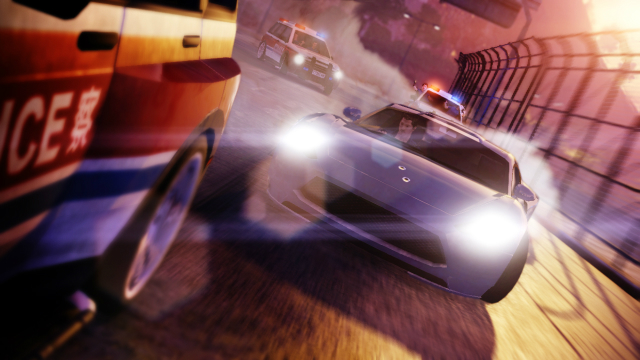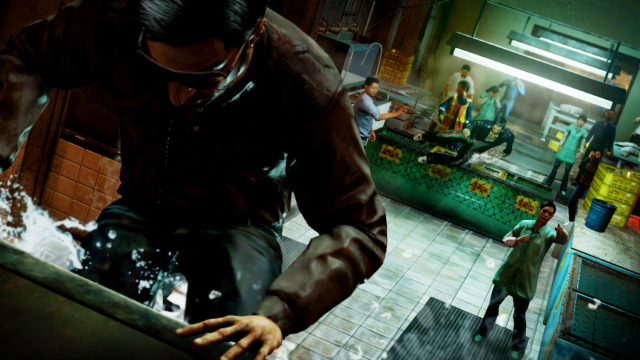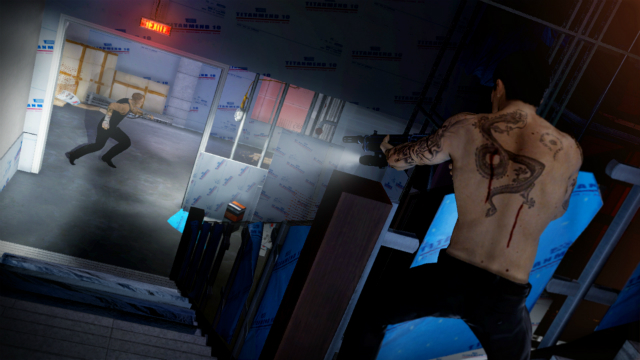Interview: Sleeping Dogs’ Dan Sochan, Producer at United Front Games
We recently got a chance to sit down with the Producer of the upcoming game Sleeping Dogs, Dan Sochan.
Sleeping Dogs is being developed by United Front Games and published by Square Enix and has been in development for quite a few years now, even changing titles from True Crime: Hong Kong to Sleeping Dogs along the way. Read on to find out what Dan Sochan had to say about one of the most eagerly anticipated games of the Summer.
We learned that Sleeping Dogs was originally True Crime: Hong Kong, but as it comes closer to the release date of Sleeping Dogs, what would you say are the main differences between the games, and is there anything that made it over from True Crime to Sleeping Dogs?
The game actually was originally created as a new IP and we were a new IP a few years before being branded True Crime. Working with Square Enix on the title, it’s actually been great. It’s given us the additional time we needed to really polish the game, refine the core mechanics – we’ve actually added in some new features as well like the upgrade system. At the end of each mission you get a score; a cop score, or a Triad score, depending on how you’ve played the mission, it’s open-world so you can play how you want, but if you shoot and kill a bunch of innocent civilians, you lose cop points. We give you style points on the Triad side if you use a variety of different martial arts, [if you] use the environmental props [like] grabbing a guy, putting his face into a grill – all those things give you additional points. You then use those points to upgrade your player and it’s a branching tree as well. So then, the player [at the end of] the game, after beating the game, is quite different to the player at the start of the game, which creates a very unique experience. Each person can develop and change their character as they want. So, these are the kinds of things the additional time has allowed us to put in and to really polish. In terms of losing anything, from when we were a new IP to now, we’ve had the same characters, same story, same features, but even added in more. So nothing’s been lost, all we’ve done is actually add more in polish.

In terms of the upgrade system, what specifically can you upgrade your character in? Is it [things like] gun skills, car driving skills?
So, yeah, there’s four different sort of areas you can upgrade. One being your cop skills. So, it’ll give you some different cop-type manoeuvres you can do, even some simple things like a Slim Jim, which will allow you to break into cars [and] less likely to alert more police. Some of them will decrease the police radius, like when you get a heat level on you. On the triad side, it’s a variety of different moves you can do, more around, sort of, the shooting and driving elements. So, something like an action dismount, where you can drive your bike towards a group of enemies, jump off in slow-mo and you shoot the bike and it’ll explode and take out a bunch of your enemies. On the melee side, you can learn new martial arts moves. You’ll learn sweet kicks, arm breaks, leg breaks; a variety of different moves, so as the game progresses, you’ll actually see your character doing new moves and you learn new combos as well that you can do. Then there’s the face as well, which is basically reputation, and as that grows you’re able to access more things in the world and some of the upgrades we allow buffs to last even longer, 50% longer; things like that. The final one is health upgrade, so the player can eventually almost double their health bar.
How close is the in-game Hong Kong to the real life city and what kind of research did you do in order to perfect the environment within the game?
We and the development team did numerous trips down to Hong Kong [and] took tens of thousands of photos of the city itself, to really kind of capture Hong Kong [and] make the architecture, the buildings, look as realistic as possible. We did the majority of all of our voice recordings down in Hong Kong, so a lot of the people [in the game world] speak Cantonese. We worked with some Hollywood actors for voice talent, Tom Wilkinson, Emma Stone, Lucy Liu, but we also worked with some Hong Kong cinema stars, Edison Chen, Will Jung Lee, and they actually mix speaking between English and Cantonese as well. We’ve tried to not be a parody of the city, but actually be as realistic and as authentic as possible. The island itself, the major landmarks, are there, but we’ve played around with the general layout, focusing on what’s gonna be best for the driving and the free-running missions, and then building the city around that.
The concept of juggling your loyalty between the police and the Triads is quite an interesting concept. Does favouring one side over the other make a huge difference to how the game will play out?
It definitely impacts what your character can upgrade; the abilities, things that they’ll learn and do. You can always go back and replay a mission as well, so if you decide one mission, “Forget it, I wanna run over every single innocent pedestrian I can, I wanna blow off some steam”, you can do that. Then, later on, hours later you’re like, “I wonder if I played that mission again, if I tried not to hurt any innocent people and if I tried not to destroy the city, what kind of score could I get?”, you can go back and replay them at any time and that score gets uploaded to a server and you can compare how you did against your friends or anyone else in the world. In terms of the core story, it remains mostly unchanged. We really wanted to tell a very specific story about what it’s like to be an undercover police officer dealing with the Triads. When we were in Hong Kong, we met with Triad gang members, we met with undercover police officers – or police officers who had been undercover, they obviously weren’t still. Again, it helped us to try and be very realistic with the story and not just tell the, “I’m an undercover cop and I’m at risk [story]”, but what it means to be undercover for years sometimes and then actually befriending some of these people that you’re supposed to be taking down.

In terms of being the undercover cop, obviously sometimes they might they have to make a tough decision between keeping their cover and also helping the innocent. Will we be seeing those kind of choices in the game?
Very much so. You’ll be seeing the decisions that Wei has to make and the impact it has on him later on. So we have some nightmare sequences – you can see Wei at the beginning of the game, he’s quite optimistic, positive, happy. By the end, he’s not sure who he can trust any more. He’s sworn to uphold the law, but to keep his cover, first he had to beat up some guys, then he’s having to get more physical and even use some weapons, next thing y’know, he’s even killed some people. So things progress very quickly and it takes a physical and mental toll on him that we really try to reflect in his voice, his animations and how he interacts with other characters.
From the demo, it seemed very cinematic when you were jumping over cover, going into a kind of slow motion, bullet time. Was that a conscious decision to make it only when you leap from cover rather than activating it at any time?
That is one of the upgrades that you can do, you can choose to activate it more than just leaping out of cover, but it was intentional and it’s not forced. Every time you jump over an object, it doesn’t automatically happen. You have to jump and and then hit the aim button at the same time to create that sequence. It’s sort of an homage to John Woo and what an amazing job he’s done capturing these epic gun fights, where they slow down and feel very cinematic in some moments. So we’ve tried to represent that in our game as well.
In the car chase sequence as well, it had very cinematic moments where you shoot the tyres and the cars slow down as they explode. Is that something that carries on throughout the game, this grand cinematic experience, rather than just a game?
That’s exactly it. We’ve tried to approach the game a little differently and not just be an open world game that has some shooting and driving. We see ourselves more as a martial arts action film that’s in an open world. So, we do introduce a lot of cinematic moments with the hand-to-hand combat, the driving, driving and shooting, and some of the vault shoots [when you leap from cover] as well to really accentuate some of these big key moments in the game.

The game was announced a while ago and you obviously received feedback and things like that. How has that shaped the development of the game since you’ve unveiled it?
We really take feedback very seriously, from the media and from the fans that we’ve met at community events, as well as focus testing, to really refine the experience, to make sure that it’s clear to the players how to get the most out of the game. It’s a very deep system, people can have fun just hitting a few buttons, but for the more hardcore gamers, there’s lots of varieties of moves, combos and everything else that you can learn. So trying to find the right balance on that, it can often be a challenge, but we’ve had amazing support and feedback from the fans and we’ve really taken that to heart and have made a lot of great improvements thanks to them.
There’s a wide variety of weapons, just even from the demo on show. How did you go about choosing what weapons to include in the game? Did you want to go over-the-top with rocket launchers and things like that, or keep it more grounded in line with the undercover feel?
We initially, actually didn’t have any shooting weapons at all in the game for the first couple of years of development. We treat weapons much more like a power up. You don’t have an inventory of weapons that you can choose from at any time. Again, taking cues from martial arts [and] Hong Kong cinema. You don’t often see Jet Li walking into a room with two giant rocket launchers. He often comes in [with] just his bare hands, his wits and his athleticism and he has to fight some enemies off and then do a disarm, quick move, get the weapon away from them, use it against a few guys, it runs out of ammo, so he has to progress forward [and] get another weapon. That’s how we really approached it in the game. So at the beginning of the game, it’s a lot of martial arts and teaching the player how to use it, then we’re introducing some melee weapons, cleavers, knives, crowbars, and then start getting into some shooting weapons as well. Ranging from handguns in to machine guns and even a couple of grenade launcher moments as well, later in the game with some of the epic missions.
You’ve got driving in the game. In-game missions and races you can do as well. How have you approached the handling of the cars? Is it more realistic or is it a more arcadey feel to the handling?
At United Front, many of us worked at Blackbox Games for years and so we worked on Need For Speed titles as well as other racing games. So we brought that experience into the game to really create a very refined driving experience. We’ve geared it a little more towards arcadey, but it doesn’t feel unrealistic; it’s not silly. We want players to feel like an action hero and not have to feel like its a very technical driving game. We want them to get out there, we’ve got a variety of different illegal street racing missions, as well as core missions that involve racing. [In] some of them you’re driving and shooting at the same time, so we had to find the right balance for all of those.

During the demo, we saw the player chasing Ponytail through the streets of Hong Kong, going through some environments and in to buildings. How much of those buildings are open, is it just limited to the scripted sequences or in the 3D open world, can you go into the buildings as well?
There’s quite a few different buildings you can go in to. We’ve got gambling dens, different varieties of stores you can enter, some of the restaurants and some of the key places like clubs and bars you can go to, karaoke bars, massage parlours. So there’s a lot of different things for the player to explore and check out and we’ve really tried to capture that essence of Hong Kong. So things like cock fighting, offshore gambling dens, poker mahjong, karaoke; things that people would expect to see in Hong Kong, we’ve brought those into Sleeping Dogs.
Finally, if somebody was interested in the game, but wasn’t sure quite what it was about, how would you best describe the experience of Sleeping Dogs?
I would say that, we really try and make the player feel like an action hero. So, trying to seamlessly go from free-running in to hand-to-hand martial arts combat, in to shooting, shooting and driving, standing on top of your motorcycle and jumping from it onto another car. We have these big moments that, if you think of some of the top martial arts film, top action films, some of those big, great moments, we try to take all of those out, put them into our game, but they’re not scripted sequences, it’s up to the player to do them.
Thanks to Dan Sochan for sitting down and talking to us.
Sleeping Dogs is currently set to be released for the Xbox 360, PlayStation 3 and Windows PC on 17th August, 2012. Keep your eyes on GodisaGeek.com for more news as well as the review of Sleeping Dogs





